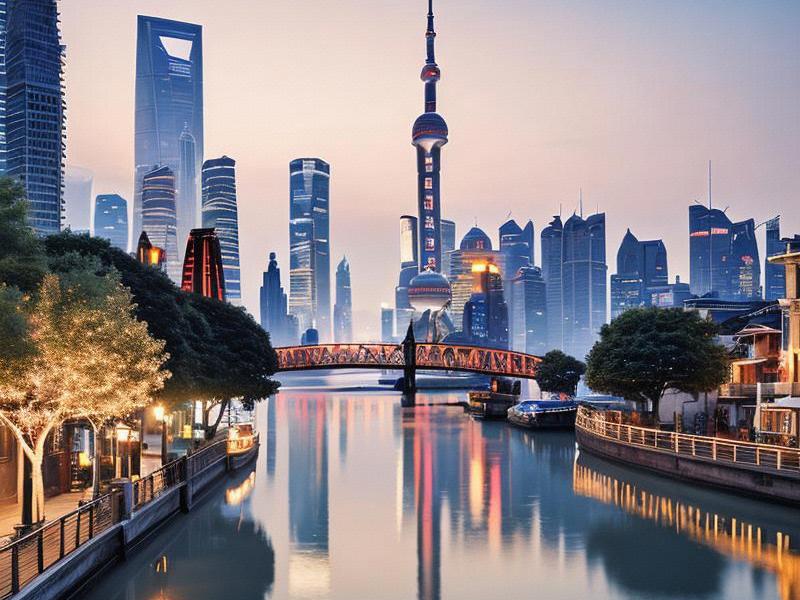
Nestled along the banks of the Huangpu River, Shanghai stands as a beacon of China's economic and cultural prowess. Once a humble fishing village, the city has risen to prominence as one of the world's most dynamic urban centers, embodying the spirit of modernization and the revival of its rich cultural heritage.
The story of Shanghai's transformation is one of resilience and reinvention. In the late 19th century, the city became a treaty port, opening its doors to foreign trade and influence. This period saw the construction of iconic structures such as the Bund, a waterfront area lined with colonial-era buildings, which still stands as a testament to Shanghai's cosmopolitan past. The juxtaposition of these historic buildings against the backdorpof the futuristic skyline of Pudong, on the other side of the Huangpu River, symbolizes the city's ability to bridge the old and the new.
Modernization has been a defining feature of Shanghai's development. The city has invested heavily in infrastructure, transportation, and technology, making it a hub for commerce, finance, and innovation. The maglev train, connecting Pudong International Airport to the city center in just minutes, is a marvel of modern engineering. The expansion of the metro system has facilitated seamless travel across the sprawling metropolis, while the construction of the Hongqiao Transportation Hub has integrated air, rail, and metro services, setting a new standard for urban mobility.
Shanghai's skyline is a visual representation of its rapid modernization. The Oriental Pearl Tower, the Jin Mao Tower, and the Shanghai Tower, the tallest building in China, are not just architectural landmarks but also symbols of the city's ambition and progress. These structures, along with the futuristic Lujiazui Financial District, have transformed Shanghai into a global financial center, attracting multinational corporations and international businesses.
夜上海最新论坛 However, Shanghai's story is not solely one of modernity. The city has made concerted efforts to preserve and revive its cultural heritage. The Yu Garden, a classical Chinese garden built in the Ming Dynasty, offers a serene escape from the bustling streets, showcasing traditional Chinese architecture and landscaping. The nearby Yuyuan Bazaar is a vibrant marketplace where visitors can experience the charm of old Shanghai, with its intricate lanterns, traditional snacks, and handicrafts.
Cultural institutions in Shanghai play a crucial role in preserving the city's artistic and literary legacy. The Shanghai Museum, renowned for its extensive collection of Chinese art, including ancient bronzes, ceramics, and calligraphy, is a must-visit for art enthusiasts. The Shanghai Grand Theatre and the Poly Theatre host a wide range of performances, from classical Chinese opera to contemporary ballet and music concerts, reflecting the city's commitment to cultural diversity and artistic expression.
The city's literary scene has also experienced a renaissance. Shanghai has long been associated with the "Haipai" school of literature, characterized by its cosmopolitan and avant-garde style. Today, the city is home to numerous literary festivals and publishing houses, fostering a vibrant creative community. The annual Shanghai International Literary Festival attracts writers, poets, and literary enthusiasts from around the world, providing a platform for the exchange of ideas and the celebration of literary excellence.
上海龙凤419杨浦 Shanghai's culinary scene is another aspect of its cultural revival. The city is a melting pot of flavors, blending traditional Shanghainese cuisine with international dishes. From the famous xiaolongbao (soup dumplings) of Din Tai Fung to the Michelin-starred restaurants offering innovative Chinese fusion cuisine, Shanghai's dining experiences are as diverse and exciting as the city itself. The night markets, such as the Nanxiang Mantou Dian and the Shiliupu Night Market, offer a taste of the city's street food culture, with their array of skewers, stinky tofu, and sweet treats.
Sustainability and environmental consciousness are increasingly becoming integral to Shanghai's urban development. The city has implemented various initiatives to reduce pollution, promote green spaces, and enhance the quality of life for its residents. The construction of the Xincheng Forest Park, a large urban park in the heart of the city, provides a haven of greenery amidst the concrete jungle. The Huangpu River waterfront has been developed into a scenic promenade, offering residents and visitors a place to relax and enjoy the natural beauty of the river.
Shanghai's education system is also undergoing significant changes to meet the demands of the 21st century. The city is home to prestigious universities such as Fudan University and Tongji University, which are at the forefront of research and innovation. The establishment of the Zhangjiang Hi-Tech Park has created a thriving ecosystem for high-tech enterprises and startups, attracting top talent from around the world.
上海品茶论坛 As Shanghai continues its journey of modernization and cultural revival, it faces challenges such as managing urban sprawl, addressing environmental issues, and preserving its unique identity in the face of globalization. However, the city's resilience and adaptability have enabled it to overcome these obstacles and emerge stronger.
The future of Shanghai holds great promise. The city is committed to becoming a global leader in innovation, sustainability, and cultural exchange. The ongoing development of the Shanghai Free-Trade Zone aims to further integrate the city into the global economy, fostering international trade and investment. The expansion of the Shanghai Expo Museum, which hosted the World Expo in 2010, will serve as a permanent venue for showcasing the latest innovations and achievements in science, technology, and culture.
In conclusion, Shanghai's transformation is a testament to the power of human ingenuity and determination. The city's ability to balance modernization with the preservation of its cultural heritage makes it a unique and inspiring example of urban development. As Shanghai continues to evolve, it remains a symbol of China's aspirations and a source of pride for its people.
